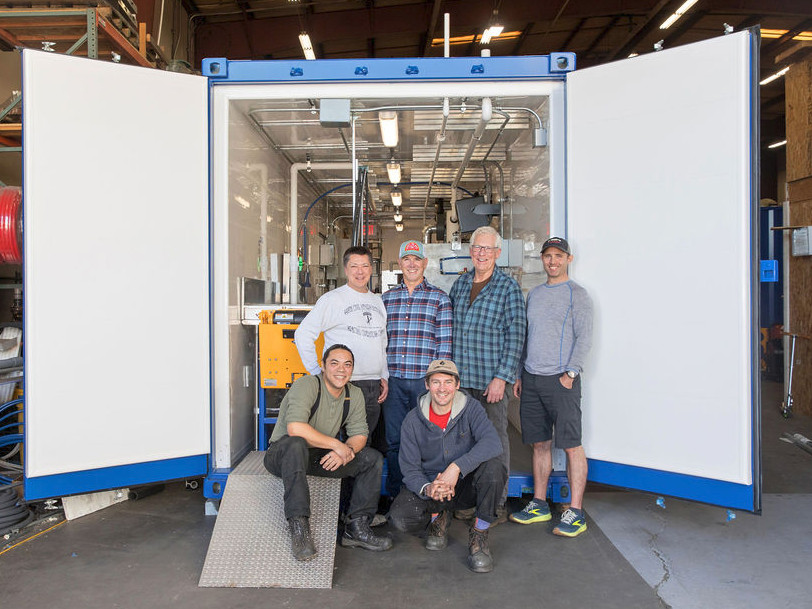Chomp, the Seattle-area company behind innovative “mechanical cows” that turn food waste into fuel and fertilizer, has been acquired by Martin Energy Group to expand waste-to-energy solutions.
Chomp, a pioneering company that transforms food waste into renewable energy and liquid fertilizer, has announced its acquisition by Martin Energy Group. This partnership aims to enhance the production, sales, and technology of Chomp’s innovative anaerobic digesters, affectionately called “mechanical cows.”
What Are Chomp’s “Mechanical Cows”?
Chomp’s digesters are modular systems that use anaerobic (oxygen-free) digestion to convert organic waste into biogas and fertilizer. These systems feature advanced odor control, making them suitable for urban and suburban use. The digesters range in size, from smaller models processing 25 tons of organic waste annually, housed in 20-foot recycled shipping containers, to larger systems capable of handling 4,500 tons of waste per year.
Prices start at $250,000 for the smaller units and scale up to $5 million for larger models, meeting the needs of both small-scale and large-scale waste producers. By utilizing naturally occurring microbes, these systems efficiently process waste while reducing methane emissions — a significant contributor to climate change.
Chomp’s Journey: From Impact Bioenergy to Acquisition
Founded 11 years ago as Impact Bioenergy, Chomp has been addressing the growing problem of food waste in landfills. Methane emissions from decomposing food waste are a pressing environmental issue, and Chomp’s digesters offer a climate-friendly alternative. The company, headquartered in Auburn, Washington, raised $4 million in funding from investors and has an impressive client list, including:
- A tofu factory on Vashon Island near Seattle
- University of California, San Diego
- California State University, Sacramento
- Seattle food banks
Customers are increasingly adopting Chomp’s systems to cut waste disposal costs, reduce carbon footprints, and produce renewable energy. For example, the tofu factory refines the biogas to power its boilers, while a Seattle food bank plans to use the gas for hydrogen fuel cells in delivery trucks and fertilizer for its rooftop garden.
Martin Energy Group: Expanding Waste-to-Energy Innovation
Martin Energy Group, a 50-year-old Missouri-based company, has a global footprint in energy technologies. It specializes in large-scale anaerobic digesters for food and animal waste, biogas production systems, heat recovery technologies, and microgrids. The acquisition of Chomp allows Martin Energy Group to integrate Chomp’s smaller, modular digesters into its broader portfolio of energy solutions.
Chomp’s Future: Staying Local While Scaling Up
Post-acquisition, Chomp will continue operating from its Auburn headquarters with its 12 employees, including founder Jan Allen. Allen, an environmental engineer with decades of experience in anaerobic digestion, designed Chomp’s containerized waste-to-energy systems. CEO Tim Tiscornia emphasized the growing demand for solutions like Chomp’s as regulators push for alternatives to landfill disposal to combat climate change.
Chomp’s Competitors and Market Landscape
While Chomp’s primary competition comes from traditional landfill waste disposal, the company is also part of a growing sector of anaerobic digestion technologies. Competitors include:
- Divert, a Massachusetts-based company focusing on larger-scale anaerobic waste management systems.
- European companies such as Qube and Seab Energy, which also offer innovative waste-to-energy solutions.
Chomp’s ability to offer smaller, modular systems tailored to specific customer needs gives it an edge in urban and mid-sized applications.
Why This Acquisition Matters
As governments and businesses face increasing pressure to reduce greenhouse gas emissions, solutions like Chomp’s mechanical cows are poised to play a crucial role in sustainable waste management. The partnership with Martin Energy Group not only provides Chomp with resources to scale its operations but also underscores the growing importance of renewable energy technologies in tackling the global climate crisis.
While the terms of the acquisition were not disclosed, the deal highlights the potential of innovative waste-to-energy solutions to disrupt the status quo of landfill reliance.
